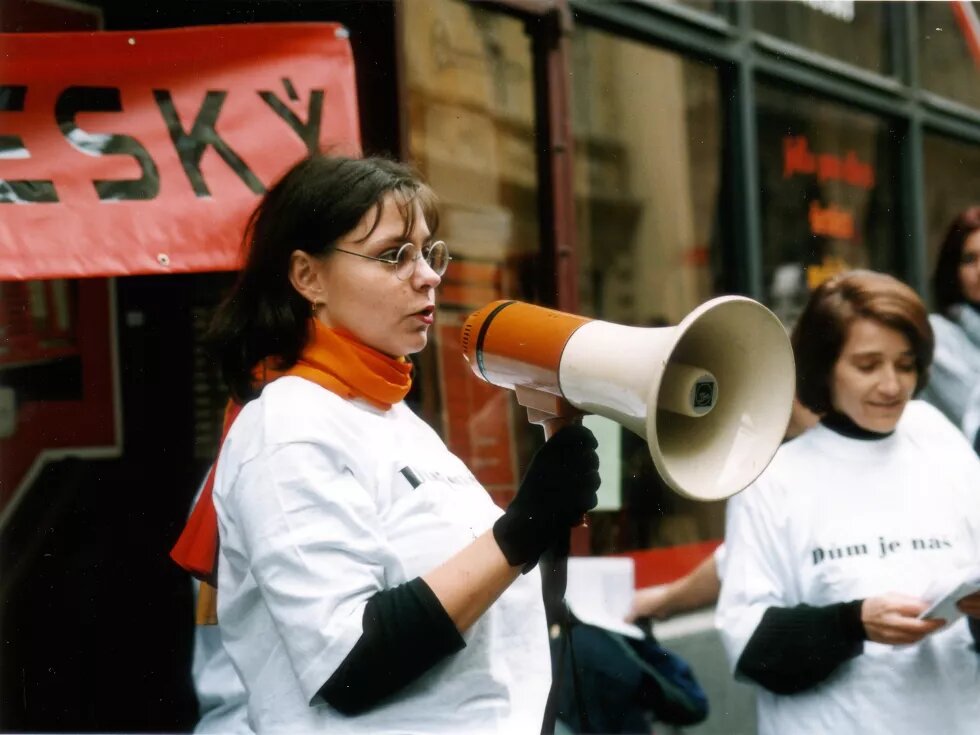
Although Michaela Marksová Tominová studied natural sciences, she has long been engaged with the issue of equality of women and men—from her tenure in the non-profit sector, to journalism, to the top echelon of politics. For years, she has expressed her views on the position of men and women in society, on issues of women’s rights and on family policy, publishing articles and appearing in the media. She was one of the initiators of the so-called “women’s shadow cabinet” in 2001, when there was not a single woman in the Czech government of Miloš Zeman. She is the co-author of the publication Na cestě do Evropskéunie: průvodkyněnejen pro ženy [On the road to the European Union: A guide not just for women] and the author of the book Rodina a práce - jak je sladit a nezbláznit se [Family and work – how to coordinate them and not go crazy]. Michaela and her husband are raising two daughters.
In the years 1997–2004, she worked as director of the public benefit company Gender Studies, which since its beginnings has received significant support from the Heinrich Böll Foundation. During the two years that followed, she led the family policy division at the Ministry of Labour and Social Affairs, and in 2009–2010 she headed the division for equal opportunities at the Ministry of Education, Youth and Sport.
Since 1997, Michaela has been a member of the Czech Social Democratic Party (ČSSD). She has served in the municipal assembly for the borough of Prague 2, where she held the post of deputy mayor in 2010–2012. As part of the ČSSD shadow cabinet, she served as spokesperson for human rights and minorities. In the 2013 elections to the Czech Parliament, she ran in Prague as the 11th candidate on the ČSSD list, but was unsuccessful. In January 2014, she was called upon to join the new government and was appointed Minister of Labour and Social Affairs.
Michaela was soon able to restore the indexation of pensions and maternity grants for a second child, both of which had been abolished by the previous government. She pushed through an increase in the minimum wage and is working on implementing advance child support payments which the state would cover in lieu of a non-paying father. She is preparing legislation on social housing and has proposed a range of measures intended to help coordinate work and family life in order to make use of the potential of mothers who are unable to return to the labour market quickly, as is the case in other European countries.
In March 2015, she was elected deputy party chair, having received the second-largest number of votes. At this meeting, ČSSD finally implemented a 40% quota for women on its candidate lists.
Michaela has expressed herself repeatedly on the Beijing Platform for Action and its significance for Czech women, and participated in the UN General Assembly Special Session entitled “Women 2000: Gender Equality, Development and Peace in the Twenty-first Century” and referred to as“Beijing+5”. In an article on the occasion of the 15th anniversary of the Beijing declaration (Aspekt, 2010) she wrote in part:
After the first steps in 1998 aiming at fulfilling the obligations set out in the Beijing Platform for Action, women’s non-governmental organisations and activists expected continual work that would lead to advancing the gender equality agenda in public administration. These hopes were not fulfilled, but the “Priorities and Procedures of the Government in Promoting the Equality of Men and Women” have become a relatively useful lobbying tool and basic institutional mechanisms have emerged to improve the standing of women in society. Twelve years is too much time for such modest results, however. There have been no or almost no long-term funding sources to support the gender agenda at either the governmental or non-governmental level; most of the activities of gender focal points at ministries are only superficial; sufficient attention has not been afforded to the agenda by any of the political representatives, with the exception of the Minister for Human Rights (and later the government representative for human rights during the 2006–2010 term),and some of them even insisted that gender equality was nonsense invented by bureaucrats in Brussels; and the number of women on the elective slots of candidate lists actually declined in the 2006 and 2010 elections...In order for the Beijing Declaration and the Platform for Action to become an important lobbying instrument, we first need systematic pressure from abroad…
Five years later, Michaela views the situation of women in Czech society similarly:
Today, after more than a year in government, I still see the main causes of the inequality of women and men in the Czech Republic in the same areas: there are still relatively few women in decision-making processes (while in the current government there were at one time three women, now there are again only two).Sufficient capacity in preschool facilities is only beginning to be built, and progress is minimal with respect to children under three years of age. The Czech Republic also lags behind most of the EU in employing mothers in various flexible forms of employment. It will take another couple of years for the measures implemented by this government to start to work, and the situation will change significantly.
The fact that legislation will be approved on the required representation of both genders on candidate lists can be considered a big step forward, as can the fact that the strongest governing party, ČSSD, has finally—after several failed attempts—approved a change to its statutes requiring it to have at least 40% women on its regional and Parliamentary candidate lists.
At the same time, it is necessary to mobilise women to join political parties in greater numbers. I am not surprised that they are unwilling to sacrifice their time to sit through meetings, but the situation will not improve unless competent women become active in political parties. Participation in politics and the administration of public affairs must not be restricted to just male and female politicians, however; indeed, it must also include a wide range of civil society actors. And those of us who devote ourselves to politics should do the maximum to ensure that citizens—both men and women—take an interest in public affairs.


